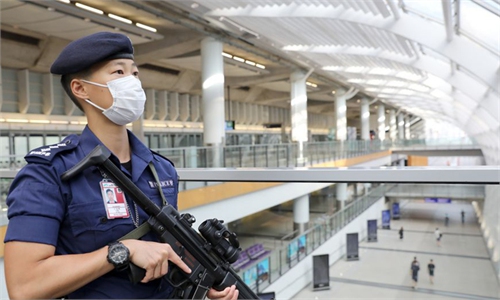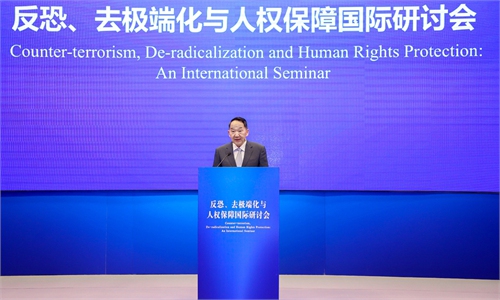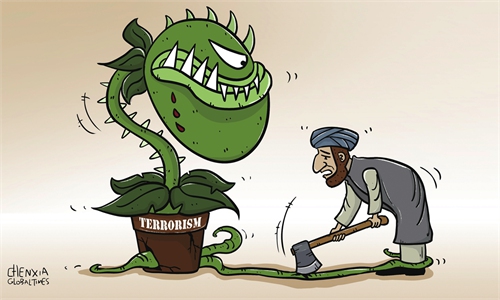IN-DEPTH / IN-DEPTH
Scholars, government officials call for joint response and abandoning double standards in fighting against global terrorism
Voices for unity
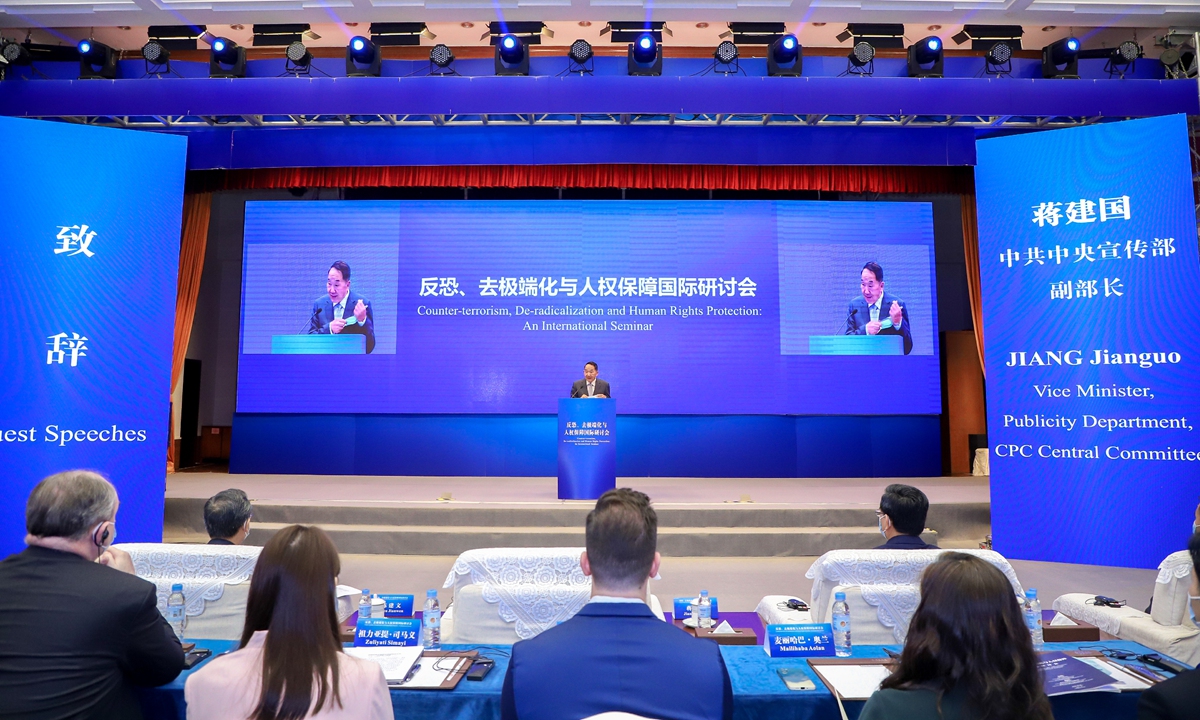
Jiang Jianguo, vice minister of the Publicity Department of the Central Committee of the Communist Party of China, addresses the opening ceremony. Photo: Global Times
Editor's Note:"Counter-terrorism and de-radicalization is a global problem and no country can be immune to it," Jiang Jianguo, vice minister of the Publicity Department of the Central Committee of the Communist Party of China, declared at the opening ceremony.
Some countries, based on ideological bias and short-term interests, engaged in selective counter-terrorism, which hinders the international community from making joint efforts on countering terrorism and de-radicalization, Jiang said.
In response to the severe challenge of terrorism, the vice minister called on some countries to abandon the practice of double standards, to eradicate extremism, to abide by the law and protect human rights.
Scholars from China and overseas exchanged views on topics around the global counter-terrorism situation. Topics on de-radicalization measures in Southwest China's Xinjiang Uygur Autonomous Region were frequently discussed against the backdrop of a US-led smear campaign on the region's measures and accusing it of "forced labor," or even "genocide."
Experts have debunked allegations of genocide in Xinjiang as "unjustified" and "weak," and displayed the West's double standards. They called on these countries to stop politicizing human rights issues or weaponizing them to attack others as joint efforts are needed to deal with the increasing threat of terrorism.
The Global Times highlights some excerpts of views shared by the participants.
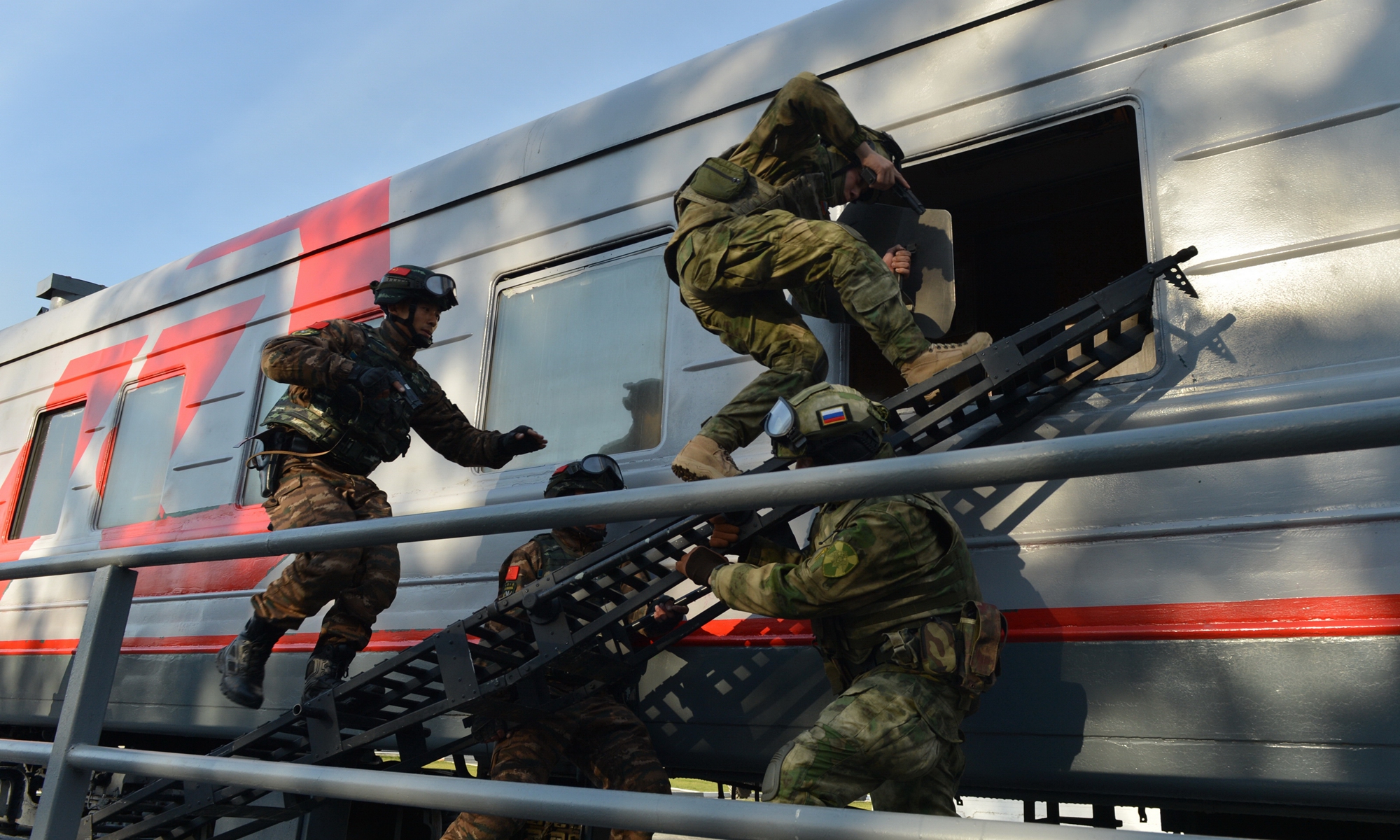
The joint counter-terrorism exercise "Cooperation-2019" of the Chinese People's Armed Police Force (PAP) and the Russian National Guard in the suburbs of Novosibirsk in October 2019. Photo: Xinhua
Debunking 'genocide' accusationWilliam A. Schabas, professor of International Law at Middlesex University in London
I'm here to speak strictly on the question of genocide, whether or not China's conduct can be labeled genocide as has been alleged by certain Western countries in a variety of forms.
This involves issues of both law and fact. In terms of the factual questions, I have no personal knowledge of the situation in Xinjiang. I've not traveled there myself. I'm relying on the claims made in the reports issued by those who contend the genocide is in fact underway. What I'm trying to do is examine whether those sources actually bear out the claim the genocide is taking place, even if the allegations in them are true.
My attention is focused on three sources that report by the Newlines institute which was issued early in 2021, the most recent US Department of State human rights report and the legal opinion issued for Uygur NGOs in the West by four members of a British law firm known as Essex Court Chambers in January of 2021.
The US Department of State report on China's Xinjiang is of no assistance at all. In its introduction and in the executive summary, it alleges that genocide is being committed. However, nowhere does it attempt to explain the legal or factual basis for such a claim. This is extraordinary superficial. And about as credible as (former US president) Donald Trump hints that China had manufactured the COVID-19 pandemic. Its treatment of the subject only reinforces the impression that the genocide allegation is being weaponized by the US in pursuit of economic and military objectives.
Turning to the report by the British lawyers, the Essex Court Chambers, paragraph 127 of that report states, "It is not clear from the evidence to date that there is evidence of an intention to physically exterminate living Uyghurs." This is a startling admission given that the Essex Court report is often cited as supporting the genocide allegation. But if the evidence of the intent to physically exterminate living Uygurs is not clear, then it is legally wrong to qualify the acts as genocide.
My conclusion is that the evidence of many of the punishable acts of genocide is weak or ambiguous. Taken as a whole, only a very weak case for genocide under international law has been made out. This may be enough to convince parliamentarians and diplomats in the West who seek opportunities to stigmatize China. But it could never ever succeed in a court of law.
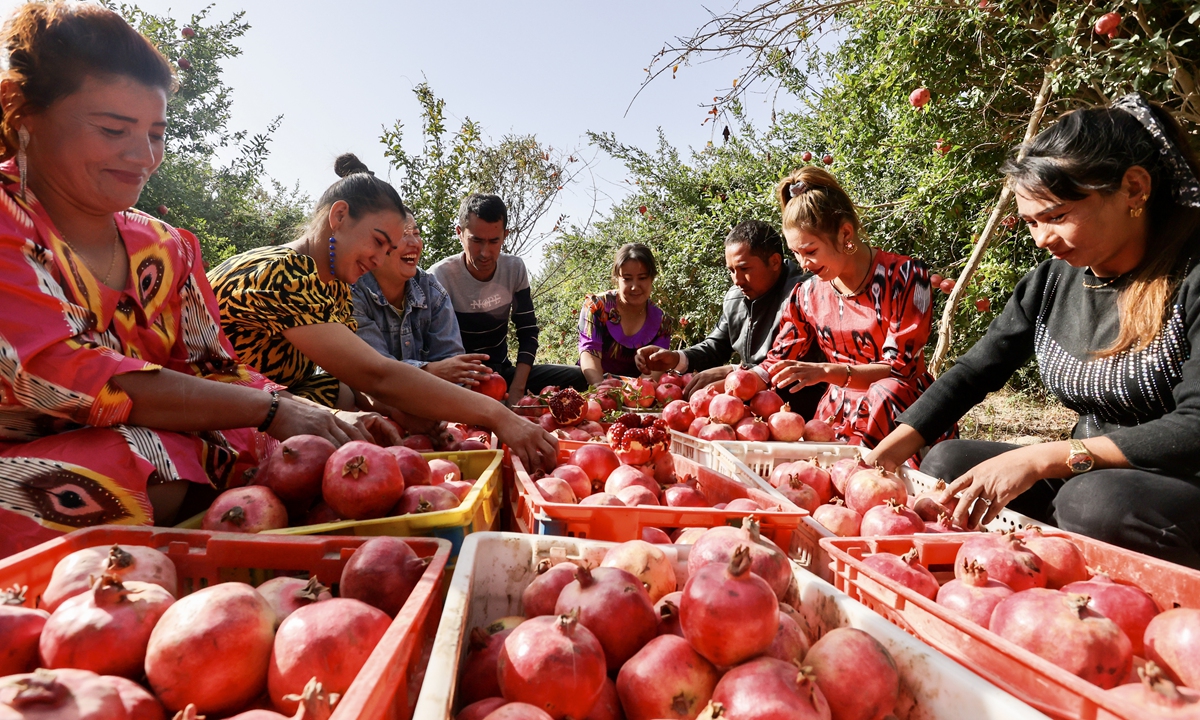
Villagers pick pomegranates in Tuopa village in Hotan Prefecture of Northwest China's Xinjiang Uygur Autonomous Region on October 1. Photo:Xinhua
Alfred De Zayas, former senior human rights expert at the UNTerrorism is criminal, because it is indiscriminate, and invariably impacts innocent people, women, children and men who have nothing to do with the conflicts at issue.
There are several kinds of terrorism, including groups such as ISIS, Al Qaeda, and "the East Turkistan Islamic Movement (ETIM)." Alas, some countries play politics, listing and de-listing terrorist groups, as for instance, in November 2020 when the US de-listed the ETIM.
Let us also not forget that, besides non-governmental terrorism, there is also what we might term as state terrorism in the form of indiscriminate drone attacks, which notoriously kill a disproportionate number of civilians, as well as the use of chemical weapons such as agent orange, white phosphorus and depleted uranium weapons. Some states also employ mercenaries and finance paramilitary forces which also engage in indiscriminate warfare impacting civilians.
Two cardinal principles of international humanitarian law are the rule of distinction between military and civilian targets and the rule of proportionality. Both have been violated by NATO in Afghanistan, Iraq, Libya, Syria and elsewhere.
It is legitimate to ask how it is possible that this can occur in democracies, where the public can theoretically call their leaders to account? The answer is simple - there exists a "human rights industry" made up of non-governmental organizations financed by corporations and lobbies, which distorts reality. Moreover, the corporate media disinforms, suppresses information about war crimes, and crimes against humanity and magnifies others.
Cutting off financial sources
Xiang Li, a deputy director of the Center for Human Rights Research, Shandong University
Today, I want to share the status quo and prospects of China's participation in international counter-terrorism cooperation in the financial field. Funds are the lifeline of terrorist activities and to take effective counter-terrorism cooperation in financial fields would help the international community closely monitor the funds of terrorist organizations and cut off their sources of money. This is an effective counter-terrorism method.
The Financial Action Task Force (FATF) is the most influential international organization on international anti-money laundering and combating the financing of terrorism. It is also the main promoter for international cooperation on combating the financing of terrorism.
On international cooperation, the FATF has five recommendations to be based on, including international instruments and mutual legal assistance.
After joining FAFT in 2007, China has offered five evaluation reports. It has also made lots of laws and regulations on counter-terrorism, finance and international cooperation and signed into many conventions. For example, China has added clauses on crimes of financing terrorism in its Criminal Law amendment and in April; the People's Bank of China released regulations on anti-money laundering and combating financing of terrorism.
There are also some problems, including related laws and regulations are applied to a limited extent and China uses channels of international cooperation very rarely in relation to money laundering and terrorist financing investigations.
Facing the aforesaid status quo, China should increase the exchange of information in money laundering and terrorist financing cases and the number of spontaneous disseminations and requests sent to foreign counterparts. Meanwhile, it should ensure that it can cooperate in a faster and more efficient manner. Procedures aimed at decreasing the time required to execute incoming and outgoing requests for international cooperation should be developed.
China should also align its mutual legal assistance requests with geographic terrorist financing risks, and ensure that it can provide adequate and timely beneficial ownership information.
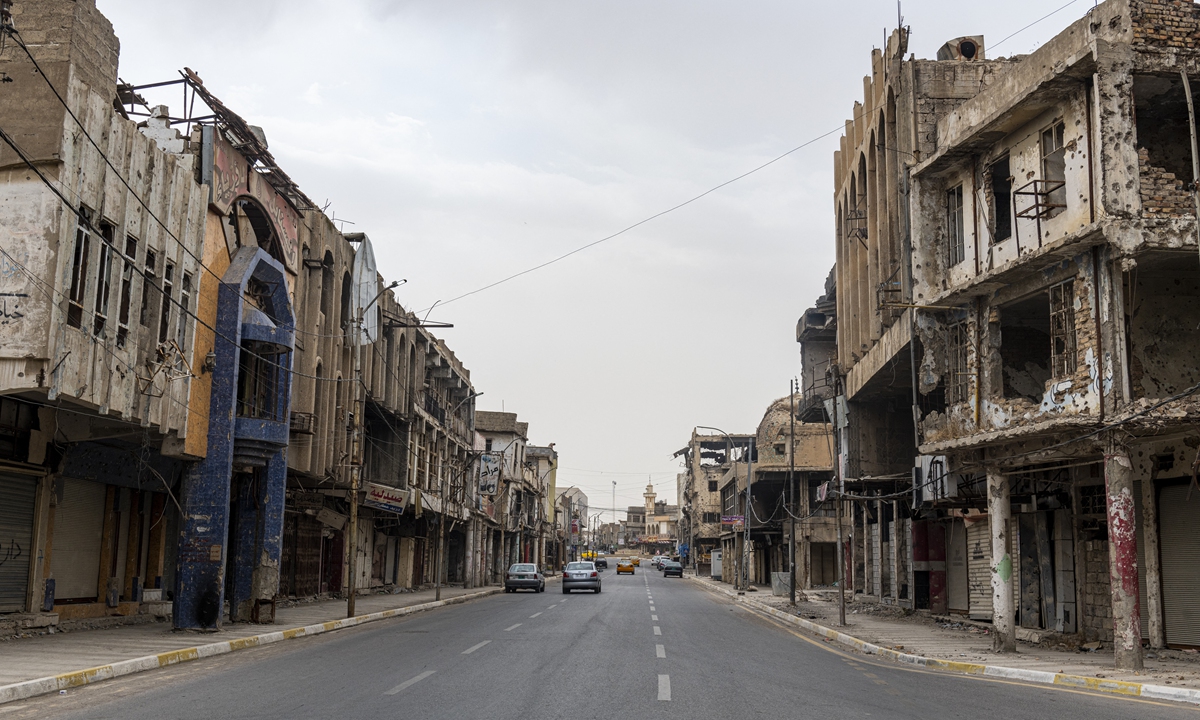
Houses destroyed by ISIS in Mosul, Iraq. Photo:AFP
Ni Chunle, a researcher from the Institute of Overall National Security Concept, Southwest University of Political Science and LawExtremism is intrinsically related to violent terrorism, and radicalization mainly includes two forms: Religious radicalization and individual radicalization.
At the legislative level, de-radicalization should be brought into the track of unified governance. In terms of international experience, the de-radicalization of countries mainly follows the "countermeasure principle of the radicalization path;" De-radicalization mainly includes preventive de-radicalization control and restrictive de-radicalization correction.
Some countries outside the region have defined the judgment criteria for radicalization in special legislation such as the Anti-Terrorism Law, so as to design corresponding countermeasures. On the other hand, in a broader sense, radicalization has been included in the legislative regulation of hate crimes to strengthen governance.
Many countries have adopted a coherent system of policies and measures for defense, rehabilitation and resettlement to carry out the de-radicalization work. Measures such as psychological counseling and religious consciousness dialogue are applied, and the design of an individualized evaluation index system is emphasized.
In terms of the discourse system, we should create and construct a discourse system that balances the supply of security and the supply of rights, expand the summary of effective experience and the output of mature practices, and build international cooperation and exchange in the field of de-radicalization.
Joint efforts urged to crack down on terrorism
Orkhan Gafarov, a research fellow of the Center for Scientific and Analytical Information in the Institute of Oriental Studies of the Russian Academy of Sciences
The threat of terrorism and extremism is one of the global problems that requires coordinated and comprehensive actions from the members of the international community. This is due to the fact that in the context of a rapidly changing world, the growth of non-military threats to international security and the stability of international relations, terrorist groups are rapidly evolving and adapting to modern realities.
The loss of the Islamic State's territorial strongholds in Syria and Iraq did not eliminate the threat of Salafi-jihadist terrorism. ISIS militants are now trying to turn Africa and the Asia-Pacific region into zones of instability. Many countries in Europe and the CIS (Commonwealth of Independent States) have faced the problem of returning militants with combat experience from the Middle East.
In this regard, the exchange of data between security structures is a key moment in the fight against terrorism. As an example, the National Anti-Terrorism Committee of Russia has created an International Counter-Terrorism Databank. Other countries can also join it. In the future, it would be possible to form a unified anti-terrorist information space.
Also, one of the examples of effective activities in the field of combating terrorism, based on international law, without politicization, hidden agendas and "double standards," is the project of the Shanghai Cooperation Organization member states-International Code of Conduct for Information Security.
Based on the UN Charter, international players need to strengthen interstate dialogue in the fight against terrorism on various regional platforms. In addition, the reconciliation on the project of the Comprehensive Convention on International Terrorism, where would be clearly defined the notion of the terrorism and extremism, will serve as an effective tool for the international community in combating these threats.
